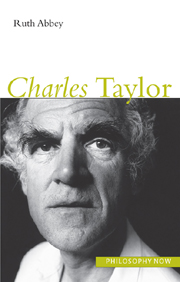Introduction
Summary
The very breadth of subject matter is … what will first strike the “Anglo-Saxon” philosopher … It is the combination of the desire for synthesis and the recognition of diversity which makes many of [his] analyses both penetrating and (necessarily) inconclusive. One becomes acutely conscious reading his work of the fact that philosophy is both an endless discussion and a source of clarification and understanding.
(Taylor 1968a: 402)The Canadian philosopher Charles Taylor is one of the most influential and prolific philosophers in the English-speaking world today. The fact that he sometimes writes in French or German, combined with the translation of some of his works into Swedish, Japanese, Spanish, Greek, Portuguese, Italian, Polish, Chinese, Dutch, Norwegian and Turkish, means, moreover, that his influence extends far beyond an English-language audience. Perhaps the most striking feature of Taylor's oeuvre is its breadth (cf. Miller 1995: 26); his work ranges from reflections on artificial intelligence to analyses of contemporary multicultural societies. Also notable is the scope of his approach to philosophical questions, for he typically brings his knowledge of Greek, Christian, Renaissance and modern thought as well as his appreciation of the arts to bear on such questions.
This book provides an introduction to and overview of Taylor's thought. As a work of this size could not convey the scope and depth of Taylor's thought in its entirety, the focus is on his contributions to some of the more enduring debates within western philosophy.
- Type
- Chapter
- Information
- Charles Taylor , pp. 1 - 8Publisher: Acumen PublishingPrint publication year: 2000



